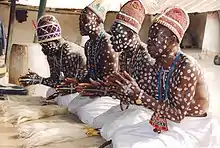Olodumare
Olodumare (Yoruba: O-ló-dù-ma-rè) also known as Ọlọ́run (Almighty) is one of the manifestations of the Supreme Creator God in Yoruba religion. [1] The name comes from the words Odu, Mare, and Oni, meaning "the owner of the source of creation" [2][1][3][4]
| Part of a series on |
| Yoruba religion (Òrìṣà-Ifá) |
|---|
 |
The Yoruba believe that Olodumare is omnipotent and is the Source of all.[5] Olodumare is aloof; he is not directly involved in earthly matters and lets other Orisha, who are his sons and daughters, answer human concerns through divination, possession, sacrifice and more.[6] However, everything is in the hands of Olodumare when they are going to bed at night.[5]
The name Olodumare symbolises a divine entity that has no father or mother and that simultaneously is and is not bound by space, time and dimension.[7]
Historically, the Yoruba worship Olodumare through the agency of the orisa; thus there is no image, shrine or sacrifice made directly towards him.[8] There is some controversy about whether Olodumare is directly worshiped, due to his aloofness from humanity.[6][4] However, there are those who also worship Olodumare directly. Olodumare is the origin of virtue and mortality, and bestows the knowledge of things upon all persons when they are born. He is omnipotent, transcendent, unique, all knowing, good, and evil.[6] The Yoruba call on Olodumare when other deities (orishas) seem unwilling or incapable to help.[7] These orisa or orishas are supernatural beings, both good (egungun) and bad (ajogun), who represent human activity and natural forces.[9] Yoruba believe Olodumare created all other forces of the universe to help continue the evolution of the universe.[5]
Stories of Olodumare
There is a Yoruba story of Olodumare holding back the rain because the orishas misbehaved. Rather than eliminate them, he watched them learn from their mistakes and suffer in the drought. The orishas begged for forgiveness, but Olodumare could not hear because he was too high in the sky. Orishas could not reach him. The least noticed orisha, Oshun,[6] volunteered to try. She became a peacock and flew up to heaven. But her feathers burned and fell off, and she transformed into a vulture. Still, she kept flying and eventually reached Olodumare. He appreciated her sacrifice and perseverance, and brought rain. He gave her the job of messenger, the only orisha allowed into the heavens to communicate with Olodumare.[10]
References
- Cynthia Duncan,Ph.D. About Santeria
- Ayegboyin, Deji; Olajide, S. K. (2009), "Olodumare", Encyclopedia of African Religion, SAGE Publications, Inc., doi:10.4135/9781412964623.n306, ISBN 9781412936361, retrieved 2019-10-10
- Mobolaji Idowu (1994), Olódùmarè God in Yorùbá Belief Longman Nigeria ISBN 9780582608030
- Ekundayo, Adejuwonlo; Ekundayo, Olugbemiga (2020), Spirituality and Mental Health: An Ifa Overview, INARC Corp, U.S.A., ISBN 978-0-9815-674-0-2, Kindle Edition ASIN B08FCVVKYG
- DAYO, CHIEF (February 14, 2016). "YORUBA BELIEVE IN ONLY ONE GOD CALLED OLODUMARE".
- Bewaji, John (1998). "Olodumare: God in Yoruba Belief and the Theistic Problem of Evil" (PDF). African Studies Quarterly.
- "Brown Williams". Retrieved 2018-10-18.
- R., Prothero, Stephen (2010). God is not one : the eight rival religions that run the world (First HarperCollins paperback ed.). [New York, New York]. ISBN 9780061571282. OCLC 726921148.
- Peel, JYL (2016). "The Three Circles of Yoruba Religion". University of California Press: 214–232 – via JSTOR.
- "Oshun Loses Her Beauty". UUA.org. 2013-07-09. Retrieved 2019-10-10.
Template:Òrìṣà-Ifá
